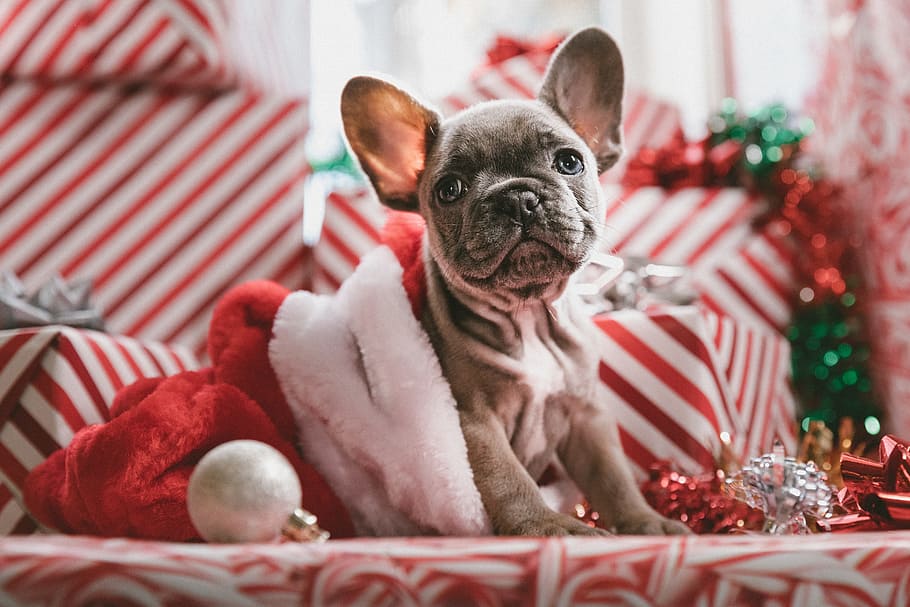Healthy Pets Make for a Happy Holiday
The season for indulging in holiday feasts and festive treats has finally arrived. However, while we try to be cautious of our own health and nutrition throughout the season, it is just as important that we care for our pet’s nutrition as well.

While you’re out grocery shopping for the perfect holiday meal is a good time to reevaluate the foods that you’re feeding to your pet. “Foods should be individualized for the pet, not chosen based on what one pet needs and then given to all of the other animals,” says Dr. Deb Zoran, associate professor at the Texas A&M College of Veterinary Medicine & Biomedical Sciences. “The key is to feed a diet that is complete and balanced.”
Dry food for dogs is typically preferred due to its lower costs, especially when supplying food for larger dogs. However, for both cats and dogs, wet foods are perfectly acceptable as well. As long as you know what to look for, the decision of which to feed your pet should be based on which they prefer. “Wet food has a high water content (about 80% water) and can also be high in protein and low in carbohydrates, all of which is good for cats,” Zoran said. “Dry foods can be quite acceptable as long as they are high in protein (at least 40%), low in carbohydrates (less than 15%), and fed in meals, not by free choice on the part of the pet.”
As for “all natural” or “diet” dog and cat foods, it is again most important that the food is balanced and has all of the necessary vitamins and minerals. “All natural pet foods are like commercial wet or dry (processed) foods in that you can’t always be sure whether they are a high quality, highly digestible product that is complete and balanced and if they will be a good choice for your pet. The same considerations exist for diet foods,” said Zoran. “In general, diet foods are fine if they are high quality and fed in the proper amount. However, there is nothing magical about weight loss diets; if you feed them too much they will still gain weight or at least fail to lose weight.” Consulting with a veterinarian or a veterinary nutritionist is important if you are unsure about the quality of the food you are selecting.
Although it may be tempting to slide your leftovers under the table and let them eat and eat to their heart’s content, there are many “human food” items that are unhealthy, and even dangerous for your pet. “Chocolate, grapes, raisins, and onions are examples of common foods people eat that can have disastrous consequences for pets, such as seizures, kidney failure, or anemia,” Zoran said.
“In general, it is best not to feed dogs or cats anything spicy, fatty, or not in their typical diet,” Zoran said. “However, small pieces of cooked meat or a vegetable can be okay. For example, feeding a small piece (it should not be more than 10% of their total diet) of cooked chicken thigh with no bones or skin is completely fine and a reasonable treat.”
When the first of the year rolls around, fitness centers become filled with people beginning their New Year’s resolutions to get in better shape. But what about when our pets need to shed a little excess holiday weight to keep healthy?
“Just like with us, weight gain is a combination of genetics, metabolism, what we are eating, how much we are eating, and how much we are exercising,” Zoran said. “Any of these can have a major effect on body weight, so it is important to feed your dog or cat good food, the right amount of it, and keep them active. The ideal situation is not to let your pet get overweight—you can help prevent this by weighing them often and then adjusting how much food they are eating up or down accordingly, and asking your veterinarian for help if you have questions or concerns.”
During the holiday season, keep in mind that most of the treats we enjoy are not good for our furry friends. Instead of sneaking them the leftovers as a holiday treat, stuff their stockings with pet toys that will keep them active and healthy.
Pet Talk is a service of the College of Veterinary Medicine & Biomedical Sciences, Texas A&M University. Stories can be viewed on the Web at vetmed.tamu.edu/news/pet-talk . Suggestions for future topics may be directed to editor@cvm.tamu.edu .
Editor’s note: In observance of the holidays, Pet Talk will be on hiatus until Jan. 8, 2015. Wishing everyone all the joy of the season!


